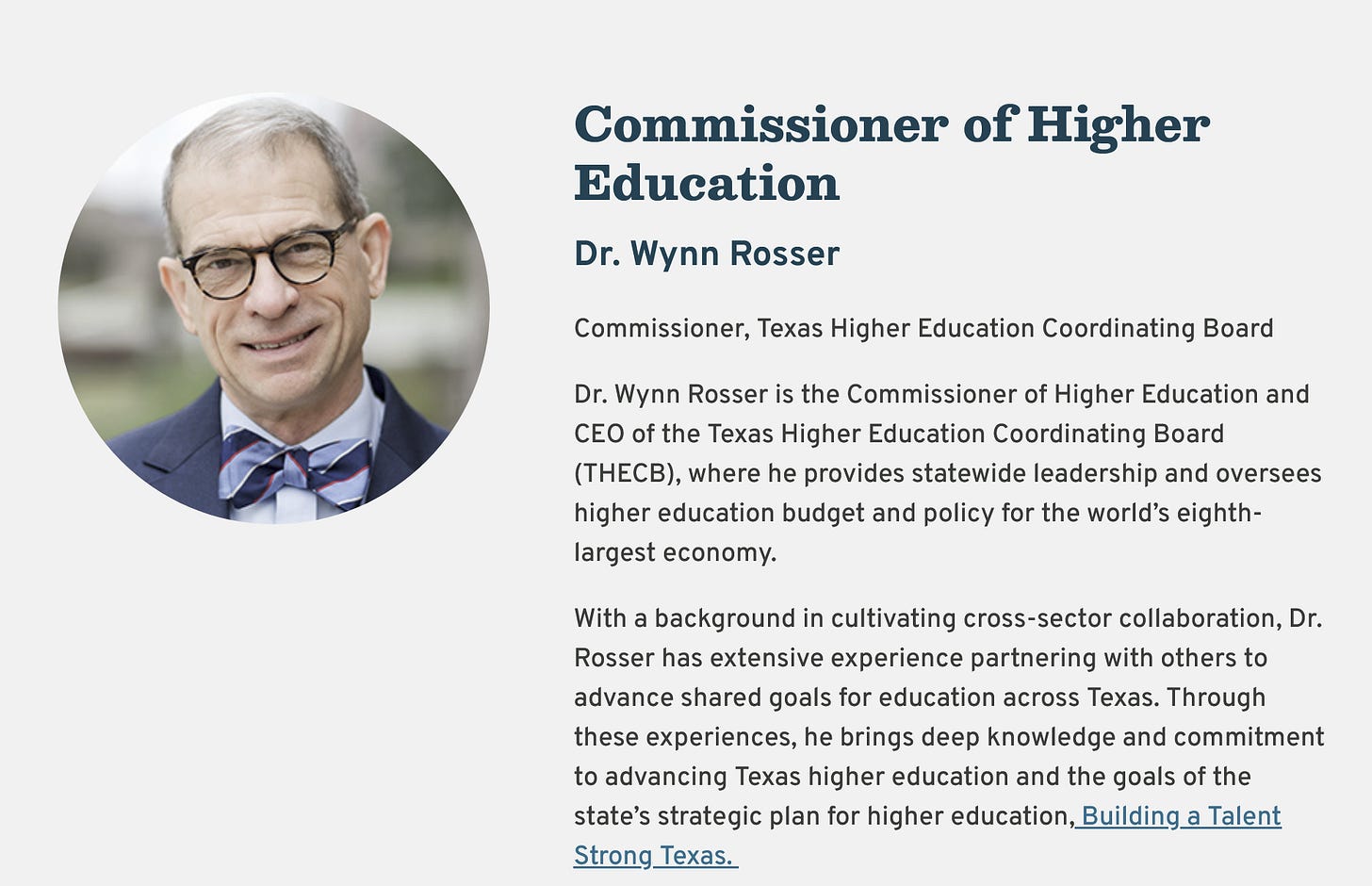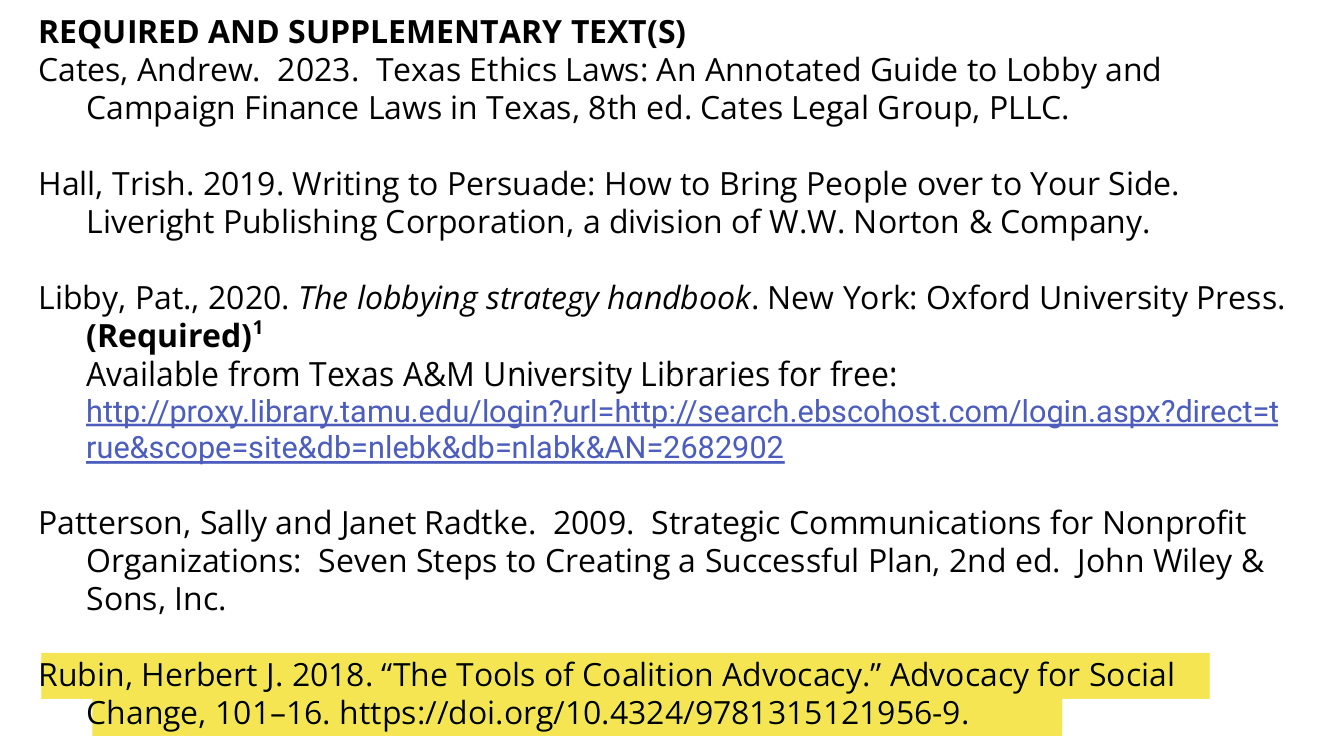Texas Higher Ed Commissioner Wynn Rosser Teaches DEI Social Justice Activism
Texas A&M PSAA 689-601 Nonprofit Advocacy in the Policy Process
Dr. Wynn Rosser, the new Texas Higher Education Coordinating Commissioner, has a long history of teaching Diversity, Equity, and Inclusion (DEI) strategies and techniques to students at Texas A&M University. To provide context, the role of the Texas Higher Education Coordinating Commissioner directly impacts higher education policies across the state of Texas, provides university state funding, manages Texas state budgeting for higher education, influences leadership hiring through mechanisms like previously used DEI statements, oversees accreditation, and allocates funding, including for DEI-focused initiatives. The commissioner can also influence university board of regents hiring through recommendations, interpret and define what constitutes DEI thereby shaping how universities might continue to adapt their DEI efforts, take a public stance on DEI issues and set the tone for how state universities approach these topics, steer state strategic direction on educational plans, approve DEI programs under scrutiny, audit universities in compliance with interpretation of the law including activities around DEI, and set regulations on how universities should comply with DEI laws.
Texas Higher Education Coordinating Commissioner Dr. Wynn Rosser is not in any way bipartisan when it comes to teaching students within a professional university environment. A copy of Dr. Rosser’s syllabus below shows his class from last year titled 'Nonprofit Advocacy in the Policy Process,' where he taught students how to exploit loopholes to allow lobbying from social justice organizations or, as he calls them, 'progressive' non-profit organizations.
Below are screenshots from Dr. Rosser’s syllabus. Students are required to read a textbook called 'Advocacy for Social Change by Herbert Rubin.'
Dr. Rosser’s class teaches students how to create an organization and how to use that organization to achieve the political goals of their clients. The textbook 'Advocacy for Social Change' teaches students how to 'legally' use lobbying strategies directly with regulators, how to engage media experts and maintain relations with media networks, how to create long-term media campaigns to influence public perception, how to fund technical research that supports a political objective, how to fund university research that supports a political objective, how to use non-profit members to protest, how to send experts to attend and present at legislative and regulatory hearings to influence officials, and how to hold conferences to encourage 'solidarity' to motivate members to continue long-term pursuits towards social justice goals, also known as Diversity, Equity, and Inclusion.
Below are screenshots from Dr. Rosser’s required reading 'Advocacy for Social Change.' The summary below directly from the book explains how FCCOs (Focal catalytic coalition organizations) guide non-profits that do not have the resources to lobby directly towards political goals. As long as non-profits, many of which receive funding from state and federal programs, pay fees to be members of large coalitions, they can receive technical data, legislative updates, directions on when to protest, directions on when talk to the media, hold events, receive invitations to attend conferences to network towards social justice goals and more.
Many social justice non-profits receive funds directly from taxpayers through state and federal funding avenues. Dr. Rosser therefore teaches how to indirectly, yet legally, use government-funded (as well as privately or anonymously funded) non-profits to generate research to promote activism goals to influence the government and public perception. The clients of the organization come from various places that may benefit from social justice policy, such as career bureaucrats, companies that may financially benefit from aligning with social justice causes, coalition leaders, non-profit executives, media networks that may receive funding, universities that receive funding for DEI research, and non-profit research groups.
What is truly eye-opening and perverse about the class is that the techniques being taught show how these national lobbying methods are legal. Most taxpayers are not aware that our government explicitly allow non-profits that receive taxpayer dollars to achieve social justice political goals. As Texas Higher Education Commissioner, Dr. Rosser is the leader of all Texas public Higher Education Institutions. This is what DEI leaders like Dr. Rosser teach in universities: to achieve political goals by any means necessary. This is how government officials spend taxpayer dollars to influence campaigns and expand their own programs. Dr. Rosser teaches students how officials can use taxpayer funding to promote their own elections through collaborations with these non-profit social justice advocacy groups and thereby increasing the non-profits funding.
The National Association for the Education of Young Children has a guide for non-profits on what they are legally allowed to lobby towards. Are American citizens aware that non-profits can meet with regulators directly? Or that non-profits that receive government funding can lobby as long as a portion of their funds is 'earmarked' as coming from the 'private' portion of their funds? This is completely perverse. Everyone knows that money is fungible, and it is absurd that non-profits receiving taxpayer dollars are allowed to advocate for causes that not only go against public values and elections but specifically towards Diversity, Equity, and Inclusion agendas. Dr. Rosser does not hold the values of conservative Texans fighting to remove woke indoctrination from schools, and his leadership will continue a shadow government that supports woke agendas being pushed in higher education.
The methods described in this book and Dr. Rosser’s class are eerily similar to the fraud being uncovered daily with the new Trump Administration. Complex apparatuses involving government officials, scientists, universities, non-profits, private donors, media networks, law firms, international partners, corporate sponsors, foundations, and more. On top of that, SB 17, the Texas bill that supposedly banned DEI, has text explicitly requiring the approval of the Texas Higher Education Coordinating Board, of which Dr. Rosser is in charge, for the DEI ban policy.
“promoting policies or procedures designed or implemented in reference to race, color, or ethnicity, other than policies or procedures approved in writing by the institution's general counsel and the Texas Higher Education Coordinating Board for the sole purpose of ensuring compliance with any applicable court order or state or federal law” -SB 17 Text
Given the context of recent DEI bills passed, which aim to restrict DEI offices and university practices, the Commissioner's role would be to navigate or implement these changes while potentially advocating for or against certain interpretations of the law. The Commissioner could also work within the framework of these laws to find alternative ways to promote inclusivity or equity if they are supportive of DEI principles. However, their exact influence would be constrained by the legislative framework and the political environment at the time. Do Texans want a shadow government implementing DEI programs, curriculums, policies and hiring behind the scenes under Dr. Rosser’s leadership? Does the public have the right to know Dr. Rosser’s background? Online Dr. Rosser describes himself as a coming from “from multigenerational rural families” and shares that he has “a family foundation focused on issues facing rural East Texas”.








